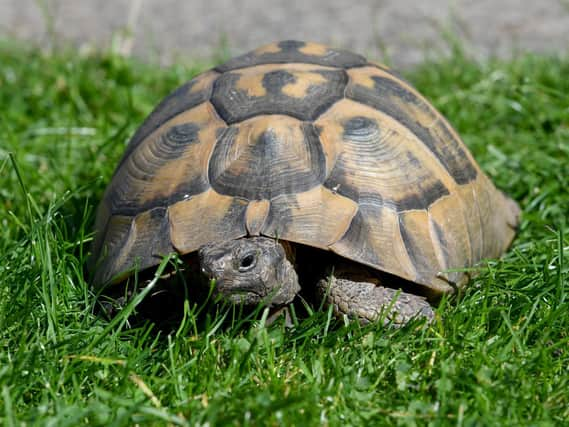Steve Canavan: I must be bored but tortoises finally win race to my heart


I’ve always been intrigued by people who keep tortoises.
My best friend at primary school was called Alan Gibbons. I remember him vividly – he had very bad eczema and appalling halitosis and for as long as I knew him never had a girlfriend (whether the last point was linked to the first two I couldn’t say).
Anyway, he owned one and I remember thinking what a rubbish pet it was. It didn’t do anything. Every time I went to his house he’d proudly lead me into the garden and say, ‘look, there’s Eddie’, and I’d stare over at what looked like a slightly odd-coloured stone, except a stone is slightly more active and exciting.
Advertisement
Hide AdAdvertisement
Hide AdTo be fair, his family looked like the type who’d have a tortoise. They were quite dull and his dad – who was in his 60s – even resembled one; he moved very slowly, ate a lot of lettuce, and walked around with a shell on his head.
Okay, so I made the last one up.
But I just couldn’t understand from that day on why anyone would want a tortoise as a pet.
Maybe this was because as a child we always had dogs and they were interesting and actually did things. They ran about, they fetched sticks, they barked loudly, they defecated all over the kitchen when you were least expecting it. They were great.
But tortoises didn’t seem to do anything.
I was mulling over this memory the other night, after seeing, on one of those weird TV channels that no one ever watches, a documentary about tortoises (I think, by the way, you can tell a lot about the current state of my social life by the fact I watched a documentary about tortoises; on Mondays I attend an online folk music session … who says lockdown life is boring, eh?)
Advertisement
Hide AdAdvertisement
Hide AdWhat I didn’t realise is that tortoises regularly live to the age of 100 years upwards and thus – if kept as a pet - nearly always outlive their owners. I suddenly felt emotional. Never before had I spared a thought for all those sad orphaned tortoises out there.
When they go into their shells – which they do when they’re scared, say, like when Simon Cowell comes on the tele – they can’t breath, so have developed a way of holding their breath for up to an hour … handy as by that point X-Factor should have finished.
And there were other things I learned.
Charles Darwin, for instance, as part of his round-the-world survey expedition, collected a Galapagos tortoise during an 1835 visit to the islands of the same name – and it lived to the grand old age of 175 before dying at Australia Zoo in 2006 due to heart failure. I suppose it makes sense though that their hearts last so long – I mean if I spent my life lying on the lawn and only moving once a week to see if the grass was any tastier down the other end of the garden, my ticker would probably be in pretty decent shape too.
There are other astonishing tales of longevity. A tortoise named Timothy served as a mascot on the HMS Queen during the bombardment of Sevastopol in 1854 and therefore was, until her death in 2004, the last surviving witness to the Crimean War. Unfortunately, though, Timothy always kept tight-lipped on the subject and declined six-figure sums to pen an autobiography and appear on Loose Women.
Advertisement
Hide AdAdvertisement
Hide AdAll these stories changed my perception of the tortoise. This creature I’d thought so dull suddenly seemed superior to other pets. I mean I’ve never met a dog who fought in a war or a goldfish that was mates with Charles Darwin.
Then even more proof that the tortoise was, after all, pretty rock n roll, when I learned that tortoises have been further into space than any man.
In 1968 – in that era when the super-powers were building rockets galore and testing whether they could put a human in space and they’d survive – a pair of tortoises were placed on board a spacecraft called Zond 5 and blasted upwards.
It became the second rocket to travel to the moon but the first to return safely … whereupon the hatch was opened and the tortoises were sat there still breathing and looking quite content, one halfway through an interesting book about the career of George Formby.
Advertisement
Hide AdAdvertisement
Hide AdAfter the programme ended I naturally, given my new-found admiration for our reptilian friends, googled tortoises and was thrilled to discover there is a British Tortoise Appreciation Society.
I immediately went to its Facebook page, though I have to say it is slightly underwhelming. They have posted only seven messages since 2011 and these include ‘TORTOISES ARE COOL!!! TORTOISES WILL RULE!!!’ (presumably in capitals with an unnecessary number of exclamation marks in an attempt to mask the utterly banal and meaningless nature of the message) and ‘Join us this week for automatic entry to the Win a Turtle Magnet competition. Winner will be announced 1st September’. With thrilling updates like that it’s a mystery as to why it isn’t a thriving site.
My final tortoise fact for the day – a sentence I’m fairly certain I’ll never write again (well, unless I land a job on Tortoise Monthly) – is that they inspired the ancient Roman military.
Yes, really.
During sieges, soldiers would adopt the testudo formation (named after the Latin word for tortoise), which involved putting their shields in front of or above them to completely shelter from the enemy.
Marvellous, eh?
I’m heading down to Pets At Home immediately to see if they’ve any in stock. The cat might sulk a bit but he’s never been to space, so tough, he’ll have to get over it.